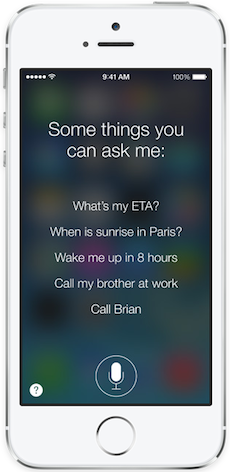In 1983 speech, Steve Jobs alluded to the iPad, Siri, the App Store, mainstream Internet connectivity, Google Maps and more

About a year and a half ago, I attended a startup event in Chicago which featured Siri co-founder Dag Kittlaus as the keynote speaker. Kittlaus' speech centered on the future of technology, though he did manage to relay a number of interesting tidbits about the history of Siri (i.e Steve Jobs wasn't a fan of the name).
In describing how the acquisition process got started, Kittlaus recalled that Apple first called Siri's office back in 2010, just three weeks after the Siri app launched on the App Store. Apple told Kittlaus to soon expect a call from Scott Forstall.
Time passed and the call from Cupertino, as promised, came in. Only it wasn't Forstall on the other end of the line, it was Steve Jobs.
As Kittlaus recalls, Jobs invited him over to his house.
And he wanted me to come over to his house the next day, and I did, and I spent 3 hours with him in front of his fireplace having this surreal conversation about the future.
Talking presciently about the future was seemingly a unique skill of Jobs. Indeed, if you go back and look through the vast number of interviews Jobs gave throughout his career, it's apparent that he possessed a rare ability to look at current technologies from a distance and anticipate how the technological landscape was destined to shift in the years ahead.
Incredibly, Jobs' uncanny ability to look into the future goes back all the way to the early 80's.
In late 2012, a rare audio tape featuring Steve Jobs speaking at the 1983 International Design Conference in Aspen surfaced. Fittingly, the theme of the conference was, "The Future Isn't What It Used To Be."
Just 28 years old at the time, Jobs spoke rapidly and enthusiastically for 54 minutes on a wide range of topics. The talk, I think, is proof positive that Jobs was one of the great visionary minds of our time. Incredibly, many of the predictions Jobs made 30 years ago would ultimately come to pass. Jobs spoke accurately about problems in technology that had yet to manifest while simultaneously predicting with uncanny accuracy when those problems were likely to be solved.
Earlier this week I listened to Jobs' entire talk and I think there are a number of excerpts worth highlighting.
Apple and the intersection of Technology and Liberal Arts

At one point, Jobs began talking about, what else, proportionally spaced fonts. In doing so, Jobs trotted out a line that would one day become a mainstay at Apple media events, if not serving as the underlying philosophy behind Apple's product roadmap.
But we're solving a problem of injecting some liberal arts into these computers. That's what we're trying to do right now. Let's get proportionally spaced fonts in there. Let's get multiple fonts in there. Let's get graphics in there so that we can feel in pictures.
Jobs talks of the need for an App Store-like storefront

When talking about computer software, Jobs explains the inherent futility in purchasing software the old fashioned way (which back then, was the only way). Bear in mind that this is 1983 and the solution envisioned by Jobs eerily resembles what would eventually become iTunes, the App Store and the Mac App Store.
And you go to buy [software] and you don't know what to buy so you go ask the computer dealer, "Which one should I buy?" And that person doesn't know. They're out selling computers, they're not looking at software. And so they give you a bullshit answer, and you buy it, and maybe you're happy maybe you're not.
Now compare that to records. Most people walk into a record store and know exactly what record they want to buy. They don't go up and say, "What record should I buy?" They know exactly what record they want to buy because there's the phenomenon of the radio station; a free sampling so that we make our decisions before we go into the distribution center for the records.
We need the equivalent in the software business. We need a software "radio station."
...
Where we'll be going is transmitting this stuff electronically over the phone line... and we'll go directly from computer to computer. And once we do that, maybe its possible to say, "Well we'll give you 30 seconds of this program for free, or we'll give you 5 screenshots, or we'll let you play with it for a day. And if you want to buy it, just type in your VISA number and you got it. I don't know how we're going to do it, but we need a radio station.
While the iTunes Store and App Store were respectively 20 and 25 years away, the overarching principles underlying those online stores had already begun to take shape in Jobs' mind.
Jobs describes an iPad-like device

Now the idea for an iPad-like device was not a Steve Jobs original. To give credit where credit's due, you might want to thank legendary computer scientist Alan Kay who, in a research paper published in 1972, eerily described an iPad-esque device. It's worth noting that Jobs really held Kay and his opinions in high esteem. You know how Jobs often liked saying, "people who are really serious about software should make their own hardware"? That's an original quote from Alan Kay.
In any event, here's Jobs talking about Apple's idealistic dream to release a book-sized device that sounds a lot like the iPad.
Now Apple's strategy is really simple. What we want to do is we want to put an incredibly great computer in a book that you can carry around with you that you can learn how to use in 20 minutes. That's what we want to do and we want to do it this decade. And we really want to do it with a radio link in it so you don't have to hook up to anything, you're in communication with all these databases and other computers.
We don't know how to do that right now. It's impossible, technically. So we have 3 options. One was to do nothing, and as I mentioned, we're all pretty young and patient, so that was not a good option. The second one was to put a piece of garbage computer in a book, and we can do that but our competitors are doing that so we don't need to do that. The third option was to design the computer that we want to put into the book eventually even though we can't put it into the book now. And right now it fits in a bread box and its $10,000 and it's called Lisa.
27 years later it'd be called the iPad.
Jobs accurately predicts when the Internet would go mainstream
During one portion of the speech, Jobs begins talking about a local area network set up at Xerox Parc and how specialized email distribution lists became commonplace.
But then an interesting thing happened. There were 20 people, and they were interested in volleyball, so a volleyball distribution list evolved. And when a volleyball game was changed, you'd write a quick memo and send it to the volleyball distribution list. And then there was a Chinese food cooking list. And before long, there were more lists than people.
And it was a very, very interesting phenomenon because i think that's exactly whats going to happen. That as we start to tie these things together they are going to facilitate communication and facilitate bringing people together and the special interests that they have. We're about 5 years away from really solving the problem of hooking these computers together in the office. And we're about 10-15 years away of solving the problem of hooking them together in the home.
A lot of people working on it, but its a pretty fierce problem.
You can make a really strong case that the Internet only started to become mainstream in or around 1996/1997, clearly falling within the 10-15 year timeframe articulated by Jobs.
Jobs alludes to what makes Siri so special

During a Q&A portion of the talk, Jobs was asked to talk about voice recognition.
Voice recognition is about a better part of a decade away. The problem isn't just recognizing the voice; when you talk to somebody, understanding language is much harder than understanding voice.
We can sort of sort out the words, but what do they all mean? And most language is exceptionally contextually driven. And with one word means something in this context, it means something entirely different in another context... And boy, this stuff's hard. So i think you're really looking at the better part of a decade before we become even close to that.
Indeed, the whole idea behind Siri is that it contextualizes queries, enabling users to say commands using natural language expressions. Indeed, Apple's Siri page advertises that the software "understands what you say" and "knows what you mean."
Jobs describes Google Maps Street View

Here, Jobs excitedly talks about technology that essentially foretold what Google Maps would be.
A neat experiment happened right here in Aspen. MIT came out to Aspen about 4 years ago and they had this truck with this camera on it and they went down every single street, photographed every single intersection in every single street in Aspen, they photographed all the buildings.
And they've got this computer and this video disc hooked up together, and on this screen you see yourself looking down a street. And you touch the screen, and there are some arrows on the screen, and you touch 'walk forward', and all of a sudden, it's just like you're walking forward in the street. And you get to an intersection and you can stop, and you can look right, and you can look straight, and you can look left. And you can decide which way you want to go. You can even go in some of the shops.
It's an electronic map. It gives you the feeling you're walking through Aspen. Then there's four little buttons in the corner because they came back and they did exactly the same thing all four seasons. So you can be looking down the street, hit winter, all of a sudden you get the same street with 3 feet of snow on it. It's really amazing.
Steve Jobs penchant for hiring A+ players is longstanding
Steve Jobs often liked to say that a small team of A+ employees can easily perform larger teams of B and C employees. This notion was evident in Jobs' 1983 speech as well.
We believe in the phenomenon of great people, and what I mean by that is we think there are people that are so good that they can run circles around 5 pretty good people. And those are the kind of people we want at Apple.. they're all idiosyncratic, they're the artists of the world. And so what we have is a very small company in terms of people for our revenue. We are going to cross $1 billion in sales very shortly with under 5,000 people worldwide, and that's phenomenal.
Apple, during its most recent quarter, posted revenue of $37.5 billion. That comes out to $2.7 billion in sales every week. Employee wise, there are currently 80,300 folks working for Apple worldwide.
You can listen to the entirety of Jobs' 1983 speech here at the Center for Design Innovation and also here via YouTube.

